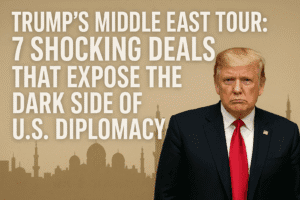Trump’s Middle East Tour: 7 Shocking Deals That Expose the Dark Side of U.S. Diplomacy
Donald Trump’s Middle East tour prioritized lucrative business deals over traditional diplomacy, cementing a $142 billion arms pact with Saudi Arabia while sidestepping critiques of its human rights record and Wahhabi extremism. His son-in-law Jared Kushner’s post-administration Saudi financial ties blurred ethical lines, raising concerns about conflicts of interest. Israel’s exclusion from the trip ignored escalating famine in Gaza, underscoring a transactional approach that sidelined humanitarian crises.
Qatar’s $96 billion jetliner deal and a controversial “gift” of a private jet sparked bipartisan scrutiny over security risks and potential foreign influence. Engagement with Syria’s new leader, a former U.S.-designated terrorist, signaled shifting alliances, while tentative Iran nuclear talks revealed recycled strategies. Trump’s muted response to Putin’s ceasefire no-show highlighted a preference for self-aggrandizement over proactive peacemaking. The tour epitomized a foreign policy where economic gains eclipse moral accountability, risking long-term instability for short-term profit.

Trump’s Middle East Tour: 7 Shocking Deals That Expose the Dark Side of U.S. Diplomacy
Donald Trump’s recent Middle East tour underscored a striking shift in U.S. foreign policy priorities, where business transactions overshadowed traditional diplomatic agendas. The trip revealed a president intent on leveraging geopolitical relationships for economic gain, even as humanitarian crises and regional conflicts simmered in the background. Here’s a closer look at the implications of this transactional approach.
Saudi Arabia: A Lucrative Partnership with Risks
Trump’s visit to Saudi Arabia solidified one of the most substantial arms deals in history: a $142 billion agreement to supply advanced weaponry. While this bolsters U.S. defense industries, it raises questions about Saudi Arabia’s motives. The kingdom’s aggressive military buildup hints at ambitions beyond regional defense, potentially destabilizing an already volatile Middle East.
The Saudis’ Wahhabi ideology, linked to extremism and human rights abuses—including the 2018 murder of journalist Jamal Khashoggi—was conspicuously downplayed. Trump’s embrace of Crown Prince Mohammed bin Salman (MBS) signals a pragmatic, profit-driven alliance. Jared Kushner’s post-White House ventures, particularly his $2 billion Saudi-backed private equity fund, further blur ethical lines, highlighting concerns about conflicts of interest and the intertwining of personal gain with statecraft.
Israel’s Absence and Gaza’s Silent Crisis
Notably absent from Trump’s itinerary was Israel, despite its pivotal role in regional dynamics. This omission came amid a worsening humanitarian catastrophe in Gaza, where Israel’s blockade has left millions starving. While Trump briefly acknowledged the crisis, his focus remained on economic deals rather than mediating peace.
Former Israeli Prime Minister Ehud Olmert echoed global alarm, calling the situation “unforgivable” and urging immediate aid. Trump’s transactional lens risks sidelining urgent humanitarian needs, prioritizing business over conflict resolution—a departure from past U.S. presidents who positioned themselves as mediators in the Israeli-Palestinian conflict.
Qatar’s Jet Gift: A Trojan Horse?
In Qatar, Trump secured a $96 billion aircraft deal but faced scrutiny over Qatar’s “gift” of a private jet to replace Air Force One. While framed as a goodwill gesture, critics warn of strings attached. Qatar’s ties to Hamas and its lobbying efforts in Washington fuel suspicions of future political leverage. Republican lawmakers, including Sen. Rick Scott, questioned the jet’s security, given Qatar’s adversarial relationships. The episode underscores the ethical tightrope of accepting foreign gifts, with watchdogs cautioning against compromised transparency.
Syria and Iran: Shifting Alliances
Trump’s meeting with Syria’s new leader, Ahmed al-Sharaa—a former U.S.-designated terrorist—marked a dramatic pivot. Al-Sharaa’s rise, backed by Türkiye, challenges Iran’s influence but risks legitimizing extremist factions. Meanwhile, Trump hinted at reviving a nuclear deal with Iran, mirroring Obama-era terms but demanding stricter limits on uranium enrichment. Such a deal could ease tensions, yet critics argue it overlooks Iran’s regional provocations.
Putin’s Snub and the Ukraine War
Vladimir Putin’s absence from Turkey-Ukraine ceasefire talks drew a muted response from Trump, who framed the snub as proof that only he could broker peace. This passive stance contrasts with his boasts of swiftly ending the war, revealing a leader more focused on self-aggrandizement than proactive diplomacy.
The Double-Edged Sword of Transactional Diplomacy
Trump’s tour epitomized the “art of the deal” at work: lucrative contracts forged, alliances realigned, and humanitarian crises sidelined. While boosting U.S. economic interests, this approach risks eroding moral authority and long-term stability. By prioritizing short-term gains over conflict resolution and human rights, the U.S. may find itself entangled in partnerships that compromise its values.
As Trump eyes a potential second term, the Middle East serves as a microcosm of his foreign policy vision—one where business deals eclipse diplomacy. The question remains: Can such a strategy sustain U.S. influence, or will it deepen regional fractures and global distrust? The answer may define the future of American leadership on the world stage
You must be logged in to post a comment.